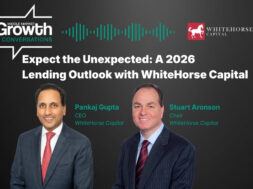Wading Through the Data of M&A Forecasts
We combed through industry research and talked to three experts to get the skinny on what PE can expect for dealmaking this year

Every January, the industry is flooded with research and analysis trying to predict what the coming year holds for middle-market M&A. 2023 is no different, and if anything, people may be paying closer attention than usual in the midst of broad market uncertainty and a unique economic environment.
Rather than have you peruse each report on your own, we’ve gathered research from leading firms and interviewed three experts to get to the heart of the matter. Here we share the dominant economic trends, key challenges for dealmakers, which industries could see the most activity and the effects of the continued rise of ESG on the dealmaking process.
Dealmaking Outlook
2022’s M&A activity closed out not with a bang, but with a whimper. According to analysis from Greenwich Capital Group, transaction volume was slightly higher in the fourth quarter than in the second and third quarters of 2022, but still down significantly from the same time frame in 2021.
So what to expect from 2023? Halfway through the first quarter, industry research and expert analysis show that despite some tough headwinds, M&A is likely to remain strong.
Citizens’ survey of 400 U.S. middle-market company and private equity firm leaders found that the outlook for 2023 was upbeat, with dealmakers seeing M&A as the primary driver of growth for their businesses. However, that optimism was tempered by concerns about hiring, valuation and decreased deal confidence, with 42% of private equity firms saying the deal environment was weak, up from 29% in 2022.
Similarly, BDO’s survey of more than 600 middle-market CFOs found that while 47% of their respondents foresee double-digit growth this year, only 16% are planning an acquisition—down from 31% in 2022. However, when combined with the 31% considering a sale and the 24% expressing interest in private equity or venture capital investment, it seems about 71% are looking to make some kind of deal.
Related content: Dealmaking in the Year Ahead
This mixed outlook of optimism for individual companies but concern for the larger dealmaking economy is doubtless a result of a tumultuous macro environment. Seth Gillston, Chubb’s EVP of private equity, global casualty and multinational, says that we’re seeing the slowdown from the second half of 2022 continue as interest rates and the cost of capital rise, though inflation has begun to level out—a good sign for PE-driven dealmaking.
“We think activity will begin to pick up in the second half of the year, where traditionally activity is cyclical,” he says. “We have seen many of our private equity clients raise a lot of capital that needs to be deployed.”
When combined with the 31% considering a sale and the 24% expressing interest in private equity or venture capital investment, it seems about 71% are looking to make some kind of deal.
Source: BDO
Major Challenges
Katten’s 2023 Middle-Market Private Equity report and Citizens’ research both found that unsurprisingly, inflation concerns and interest rate levels were the top challenges to M&A in 2023 for both PE firms and middle-market companies, with PE firms adding the limited availability of capital to their list.
“So far it appears as if the anticipated headwinds continue to blow,” David Washburn, partner and co-chair of Katten’s M&A and private equity practice, says. “Availability of financing, rising interest rates and inflation concerns continue to be top concerns for private equity investors.”
Doug Farren, the managing director of the National Center for the Middle Market (NCMM) at the Ohio State University Fisher College of Business, says many companies having to raise their prices and rates to cope with inflationary pressures. Additionally, more firms are moving to different or domestic suppliers to reduce supply chain risks and continue to struggle in a tight labor market.
“The workforce is an ongoing challenging since 2015 in fact—23% of companies say their workforce is an insufficient size for current market conditions and finding the ‘right-skilled’ workers remains a challenge for 93% of companies,” he notes.
On the positive side, Katten found that private equity firms were confident that deals would progress as planned. In fact, 84% of dealmakers said they were slightly or significantly more confident that deals would close as compared to this point last year.
Promising Sectors
In a challenging economic environment, some sectors seem particularly ripe for M&A interest. According to Katten, the three industries with the most M&A opportunity for 2023 were financial services, technology, and insurance.
Washburn says that while technology in general is an area of interest to dealmakers, artificial intelligence particularly has become a hot commodity for PE investors: “We believe that private equity investors will continue to focus on [this sector] as companies seek out ways to offset rising costs and continuing labor shortages.” He also predicted that the renewable energy sector would continue to attract interest due to new incentives created by the Inflation Reduction Act.
Retail is also ripe for M&A, according to research from Chubb and the NCMM, in large part because the industry is extremely susceptible to the macroeconomic challenges of the moment, says Farren. As inflation drives up the costs of raw material, supply chain disruption is proving historical inventory stock numbers insufficient to current demand. On top of that, there’s a national shortage of store associates, warehouse workers and office workers. All of these challenges have leaders looking for deals to alleviate these pain points.
ESG Impacts
Environmental, social and corporate governance (ESG) issues are shaping up to be an important factor in M&A this year. The middle-market CFOs surveyed by BDO said that 41% plan to pursue ESG strategies in 2023 and 79% said they would maintain their ESG investments even in the face of an economic downturn. Acquisition targets with effective ESG metrics are likely to be extremely attractive in the coming year.
Related content: How ESG Is Changing the M&A Landscape
“Today, private equity investors recognize that it’s critical to assess a target’s ESG factors at the same time and with the same degree of scrutiny as other, more traditional diligence factors,” says Washburn. “Regulators are proposing and implementing ESG initiatives at a record pace. As a result, identifying and acquiring targets with higher ESG metrics is critical because it ensures that investments are better situated to handle expected ESG changes and therefore likely to be sold at a premium on exit.”
Overall, we can expect that a company’s ESG risk management will now be part of the standard due diligence process for corporate M&A transactions, says Gillston. This trend is being driven not just by regulatory pressure, but by company leaders seeing improved business resilience and better recruiting and retention, according to BDO.
Even while market pressures and economic uncertainty squeeze companies, the upside is clear: M&A is likely to continue strong in 2023. “Recession concerns are still a possibility,” says Gillston. “However, we are optimistic and bullish that things will begin to stabilize, with rate increases leveling off and sponsor firms reengaging on acquisitions.”
Hilary Collins is ACG’s associate editor, based in Chicago.


